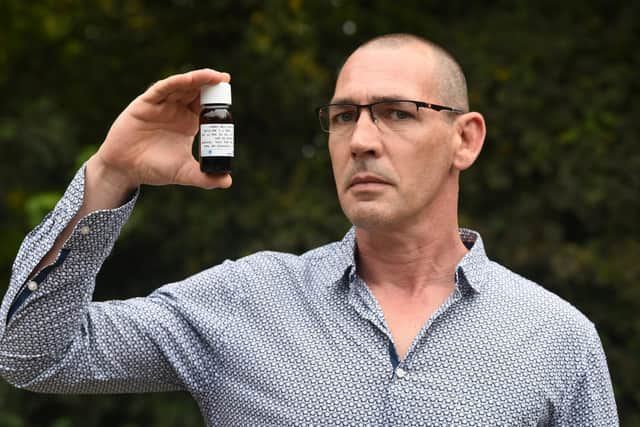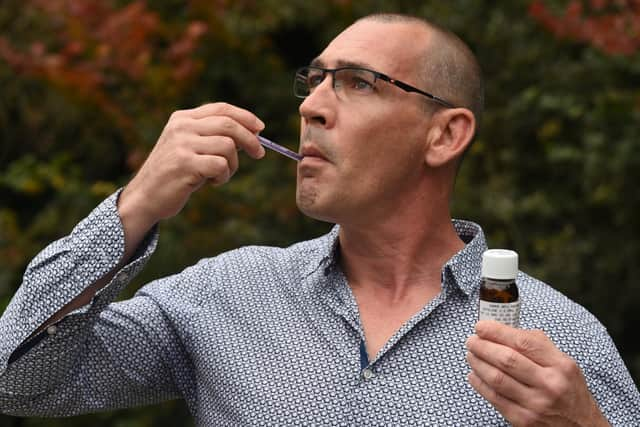Leyland man sentenced over drug farm speaks as cannabis growing investigations hit more than 350 in county
and live on Freeview channel 276
Those were the words of Judge Simon Medland QC as he sentenced a 45-year-old man who was caught growing 137 plants at his Leyland home.
Jonathan Coates, from Leyland, says he grew the yield - which officials valued at £27,600 - to find a solution to chronic pain caused by two life changing accidents.
Advertisement
Hide AdAdvertisement
Hide AdCannabis farms are increasingly prevalent in Lancashire, with 355 drug farm investigations - ranking from the smallest plant to a colossal growth - launched by Lancashire Police in the 12 months from October 2019 to September 2020.


Last Wednesday a £200,000 cannabis farm was exposed on West End Road in Morecambe. Police say the threat from the domestic commercial cultivation of cannabis is increasing.
Its cost to our society is well documented, with illegal cannabis cultivation linked to serious organised crime in the county, from robberies to trafficking and exploiting vulnerable people.
People who grow it or sell it risk prison and a criminal record for life.
Advertisement
Hide AdAdvertisement
Hide AdUsers risk anxiety, paranoia, problems with attention, memory and coordination, acute mental impairment and dependency, which can lead to other problems such as dealing the drug to pay off a debt to a dealer.


The plants produce more than 100 active compounds or cannabinoids, including the psychoactive compound delta-9 tetrahydrocannabinol - THC - responsible for the drug's mind-altering effects.
Some research suggests cannabis is a 'gateway' drug likely to precede use of other illicit substances.
Despite the known risks to user's mental health, it is thought THC, which resembles cannabinoid chemicals that occur naturally in the body and stimulates the brain’s cannabinoid receptors, can reduce pain levels.
Advertisement
Hide AdAdvertisement
Hide AdThere can also be benefits from a second substance called cannabidiol, or CBD - a recent addition to many health products -but it is only legal in the UK if it has been "derived from an industrial hemp strain that is EU-approved and contains no THC.
Jonathan was sentenced to four months, suspended for 18 months, with 40 rehabilitation days after admitting creating his own cannabis farm in a bedroom and garage.
The former HGV driver argued he was experimenting with 40 different species of cannabis to try and get the right balance between the amounts of THC and CBD to treat his ailments.
He suffered excruciating injuries in an industrial accident in Holland in 2000, aged 25, in which he was crushed by falling metal pallets and pinned against his wagon by a 3.5 tonne forklift truck.
It smashed his knee and damaged his spine.
Advertisement
Hide AdAdvertisement
Hide AdHe returned to the UK and retrained in IT but still couldn't find suitable work as it all involved sitting for long periods of time.
Still struggling with his injuries he turned to cannabis to self medicate and was convicted in 2008 and 2009 of growing cannabis, though the courts accepted it was for his own use.
Afterwards he met a new partner and they moved in together in Broughton.
But a serious road crash in 2012 left him with a life changing jaw injury that has required experimental surgery, and severe tinnitus.
Advertisement
Hide AdAdvertisement
Hide AdThe impact broke and dislocated his jaw, and two subsequent surgeries damaged his Eustachian tube and affected his balance.
He was prescribed opiates such as tramadol, codeine and morphine to deal with the chronic pain, but he says the effects were catastrophic, leading him back to cannabis use.
Very few people in the UK are likely to get a prescription for medical cannabis, as it is usually used for rare, severe forms of epilepsy, adults with vomiting caused by chemotherapy and people with muscle problems caused by multiple sclerosis.
Jonathan was no exception, recalling: " The doctors looked at me like I was crazy.
Advertisement
Hide AdAdvertisement
Hide Ad"There's a myriad of pros and cons but for me it comes down to quality of life.
"Being prescribed opiates ruined my life, broke up my relationship.
"Before the car accident I was happy, settled with my partner, we had pet dogs and hobbies. Opiates turned me into a zombie, into not being able to have a conversation. My partner ended up becoming my carer as well as doing her job and looking after the house, and couldn't carry it on any more.
"The medics tried everything, physio, surgery, cortisone injections, every pain medication that they could go through.
Advertisement
Hide AdAdvertisement
Hide Ad"I still had pain and mobility issues from the work accident but now all these new ones.
"I'm not going to say it didn't take some of the pain away, but I had no quality of life and became dependent on people around me. If it wasn't working it was a case of 'take more, we'll up the dose' - you're sat there like a zombie.
"Opiates made me a danger to myself, I either needed to go into residential care or be cared for at home.
"I even reached a point where I made contact with two euthanasia clinics because I'd tried everything and felt death would be better as opposed to taking opiates and needing residential care.
"My family was distraught, shocked."
Advertisement
Hide AdAdvertisement
Hide AdHe researched how to grow different strains in a bid to reduce his opiate use, adding: "Compared with the opiates cannabis means I can live a life rather than merely exist.
"The stuff I bought on the streets made me loopy because it is high in THC.
"I wasn't able to get it legally on a prescription so I turned to growing it myself - it meant I knew what was going into it, how much CBD was in it compared to THC.
" I was petrified when I was arrested because I knew this was the third time.
Advertisement
Hide AdAdvertisement
Hide Ad"But when you are in that state, so desperate, I figured that between risking prison, ending up in a clinic in Switzerland or ending up in residential care on opiates it seemed the lesser of all evils."
Ironically, on August 4 - 51 weeks after his arrest, and seven weeks before his court case - Jonathan was accepted onto a medical study in which medication containing cannabis is dispensed to him legally - though it costs him around £300 a month with subsidies.
During his sentencing, Judge Medland added he "warmly encouraged" him to find a lawful route to ease his symptoms and said the rehabilitation activity would "assist him to find a way to manage his life without breaking the law."
He added: "I fully appreciate this defendant has had a very sad life where a number of very bad things have happened, but for the life of me I cannot see the heavy consumption of cannabis would be doing his mental wellbeing any good at all."
Advertisement
Hide AdAdvertisement
Hide AdA police spokesman said the community's vigilance could help shut down cannabis farms.
He added: "In particular, there has been an increase in small-scale grow sites; domestic or residential premises are the favoured location. If you suspect a property is being used in the production of cannabis, there are signs to look out for."
It includes a pungent smell coming from the property, electrical wiring that has been tampered with, powerful lights left on in the house throughout the night, blacked out windows and large quantities of bin bags, full of 'vegetable material' thrown away.
Call police on 101.